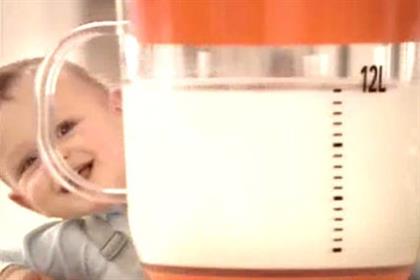What is the big problem in our culture with young infants being dependent on their mother? I know at the moment there are big social pressures to leave the baby ASAP and reclaim independence, but they are so teeny and dependent for such a short time. Believe it or not very quickly it's over and baby is busy exploring the world, too busy to want to spend hours with mum, and the time when mum can meet every need with just her body is gone forever. The breast meets every need a young baby has; hormones to help them sleep (yes this is why your baby want's to feed to sleep, yes it's normal, no they won't do it forever!) nourishment, immunological protection, warmth, security, the list goes on and on...
Non nutritive sucking (or "just for comfort") is the fluttery sucking that happens at the end of a breastfeed, when the rhythmic swallow pattern has ceased. It is hugely important to a baby on many levels: neurologically, psychologically and physically - so much so that if a baby is bottle feeding, they should have access to a clean finger or pacifier. But lets really look at what that is - it's an artificial nipple, a copy, a substitute for the real thing; even the name "dummy" tells you exactly what it is. When baby refuses it in favour of their mothers breast, the real thing, should we really be surprised? If someone wants to use a dummy, and is aware of all the implications (which I will come onto in a moment) - that's absolutely their choice, but we have gone far beyond that, to where a mother nurturing her infant is no longer desirable or even normal, instead the idea panics many - mum is told "bad habits" will form, or he will never sleep, or whatever other fantastic myth someone has decided to attribute to it - ah yes he was a late potty trainer, well that's because you breastfed on demand - rod for your own back.
It starts at birth, because babies biological instincts are such a contrast to what our society now deems acceptable, to our cultural norms. Human infants are only born with 25% of their developed brain; the other 75% develops after birth - experts believe this is due to increased brain size which has forced earlier delivery to enable baby to fit. Some now feel the first few months out of the womb, are actually a fourth stage of gestation - baby should still be attached to mum but externally. As a consequence of this immaturity, the human infant is forced to rely on external support, especially during the first 6-12 months of life (McKenna) They are programmed to be near mum, feed little and often, and frequently cry when they are put down away from her. To to combat this, instead of responding to baby (or "give in" as some claim), mums are told to give a "lovey" or comfort blanket so that baby can smell you when not with them, or take security in an item. I was once told this concept originated from orphans who had no mothers - I've no idea if it's true but really, is it healthy for a child to be securely attached to a piece of cloth rather than a human? doesn't matter if mum is here, as long as I have my lovey and we see children carrying these round at 4/5 years old! In cultures and social circles where mum keeps baby close and feeds on demand (not schedule feeding purely for nutrition) - having a security item is beyond rare. Has anyone studied the psychological impact outcome long term of "loveys"?
Perhaps some get wary as they see toddlers right through to school age children wandering round the supermarket, attempting speech through a plastic plug and think of the horror if they were expecting this from a breast. But the reality is that whereas pacifiers are habit forming, a baby gradually cuts down their feeding as they develop - sure some toddlers will have phases of manic feeding, often tied in with a big change such as starting nursery, house move or mum returning to work, it's still a big reassurance and comfort to them; but the big need to non nutritive suck diminishes dramatically after the first six months which ties in with introducing solids.
Comforting your baby with the breast and meeting all their needs will not make them clingy, dependent, unsociable, needy, non sleepers - or anything else that gets sold as a pitfall - this is what baby is born biologically expecting. In fact overwhelming evidence shows that the better we meet an infants needs, the more confident, independent and sociable the young child becomes. But if you think about it that makes perfect sense in terms of human nature - the more secure we feel, the more confident. Pushing independence and forced separation actually has the opposite result of making the recipient "cling on", searching for reassurance.
As mentioned above - the breast is the norm and the pacifier is the "intervention", and so with that comes the potential for risk; sucking is intended to be intricately linked with feeding - so separating the two is a significant shift. Studies have linked numerous issues with dummy use and whilst research can never prove something 100% when several studies begin to find the same outcome, it is of course worth considering in the decision making process. Some babies seem to take one with no obvious impact, whilst for others it can cause problems almost immediately. Level of use is also significant - using one for a short period when driving, or perhaps when sorting one twin and another needs to wait, can of course be helpful and unlikely to impact massively on many babies - especially once breastfeeding is established; but frequent use can create dummy addicts, rarely seen without one. I've even seen some mothers use them to make a baby stop babbling too loudly in public, or just because they had finished their bottle - despite baby being completely content; to me this is completely inappropriate.
1) SIDS - whilst some studies "appear" to show a reduced risk of SIDS when using a pacifier (although this research is definitely worthy of discussion!), others believe pacifiers increase the risk of SIDS by exerting abnormal pressures on the oral cavity, affecting the throat. The significant piece of SIDS research also showed stopping using a pacifier created the most significant risk - and how do parents guarantee a baby keeps on accepting one? I plan to discuss this more in another blog post as it has been requested on "Ask The Armadillo".
2) Changed oral development - adverse outcome has been strongly highlighted in relation to dentition, dental caries and malocclusion (Bowden, Paunio, Rautava & Sillanpaa, Karjalainen, Ronning, et al,Ollila, Niemela, et al, Gizani, Vinckier & Declerck). Extensive used has even been linked with changing oro-facial structure and long term issues such as sleep apnoea (although this risk is greater for non breastfed infants)
3) Reduced duration of breastfeeding - many studies have linked both early introduction of a bottle and pacifier use with shorter duration of breastfeeding. One found:
Pacifiers may be an effective weaning mechanism used by mothers who have explicit or implicit difficulties in breastfeeding, but they are much less likely to affect infants whose mothers are confident about nursingWhilst another found increased risk regardless:
Among 249 children still breastfed at 1 month, the risk that a child would be weaned at any age between 1 and 24 months was higher in pacifier users than in non-users. The association remained even after adjustment for the child's age, sex, birth weight, socioeconomic status, and age at introduction of bottle-feeding.I think how a pacifier is used may also influence this. If baby has breast for "food" and pacifier for "comfort" (ie the mum desperately trying to prevent bad habits), once his nutritional needs are met elsewhere, he is far more likely to wean and stick with his comfort item - these are the babies parents often claim "self weaned" long before the normal biological age. This ties in with another study that found the more times per day the pacifier was used, the higher the risk of early weaning.
4) Reduced time at the breast - In the early days, hunger is driven partly by a hormone called CCK - the same hormone that induces relaxation and sleep. After a feed baby has a high level of CCK, which tells him he’s full, but it drops again after another 10 or 20 minutes, so he thinks he’s hungry again. He may go through this loop several times, in what’s known as “cluster feeding,” before dropping into a solid, longer sleep. There is suggestion this system allows baby to fill their whole digestive system so excess hunger doesn't occur during a longer sleep spell. The key point is that sucking, not swallowing makes baby feel full and therefore pacifiers can cause babies to miss feeds which can impact further in the following ways:.
5) Reduced breastmilk supply - as feeding becomes established, the only indications mum's body gets about how much milk to make is how often baby feeds and how effectively they empty the breast. When introduced in the first few months pacifiers can cause infants to miss feeds, and prevent mum's body receiving the cues about how much milk to produce. As the most common reason for stopping breastfeeding is "insufficient milk supply" (whether perceived or actual) and most infants have a pacifier which may interfere with this mechanism.
6) Reduced weight gain - several studies have found regular pacifier use is associated with fewer feedings and reduced gain:
Findings indicated that the pacifier group breastfed approximately one less time per day and had a 15 to 30 minute shorter total suckling duration per day during the first 4 months of life than the group who did not use a pacifier. During the first 2 months of life, infants who used a pacifier had a mean of 0.5 feeds less per day and had 15 to 30 minute longer feeding intervals than infants who did not use a pacifier.7) Reduced efficiency at the breast -
Sucking on an artificial nipple is different from sucking at the breast. The artificial nipple is already formed and fairly rigid. The breast is soft and flexible. The baby must open his mouth wide to latch on to the breast, and the nipple goes to the back of the mouth, away from the movement of the gums and tongue. A caregiver can coax a pacifier into a baby's closed mouth. The muscles of the mouth and face and the tongue move differently when sucking on an artificial nipple; the action used to drink from a bottle or to calm down with a pacifier won't get milk out of a breast.
Switching back and forth from breast to artificial nipple is a lot to ask of a baby in the early days of learning to breastfeed. A baby who tries to suck at the breast the way she sucks on a bottle nipple or a pacifier will quickly become frustrated and may cry, fuss, or refuse to nurse. She won't get much milk, and she may have a difficult time learning to breastfeed effectively. (LLLI)8) Nipple confusion and soreness - the different technique required for a pacifier can cause -one study found babies were twice as likely to have breastfeeding problems as those who didn't have a pacifier (73% developed problems compared to 30% that did not)
9) Ear infections - several studies have found a connection, with one finding risk was doubled if the baby has the pacifier 5 or more times per day.
10) Increased risk of thrush - because the fungus that causes thrush thrives at room temp on moist surfaces a pacifier has the potential to increase rates of thrush. Several studies have found a greater incidence of candida, the fungus that causes thrush among babies who used a pacifier - the research suggested it may affect a baby’s ability to effectively clear sugar from his mouth. May also be linked with tooth decay - see here.
11) Increased risk of infections, including antibiotic resistant strains - One study found a wide range of disease-causing bacteria, fungus and mold on pacifiers that young children had been using. They added that pacifiers can often grow a slimy coating of bacteria called a biofilm, that actually alters the normal bacteria in a baby or toddler's mouth. That biofilm can spur inflammation and potentially increase the risk of developing gastrointestinal problems such as colic or even ear infections.
In fact, the same types of bacteria found on a common pacifier have been linked to cardiovascular disease, metabolic syndrome, allergies, asthma and autoimmune diseases, said study author Dr. Tom Glass, a professor of forensic sciences, pathology and dental medicine at Oklahoma State University.
The researchers cultured 40 different species of bacteria from the 10 used pacifiers. One pacifier was contaminated with four different strains of Staphylococcus aureus. What was particularly concerning, said Glass, was that many of the bacteria growing from the used pacifiers were resistant to commonly used antibiotics such as penicillin and methicillin. (1)
12) Habit forming - some infants use their pacifier as their comfort item, and thus are not keen to be parted with it! Resulting in prolonged dependency (the opposite of it's original aim then!) on an item and less autonomy. In older babies it can hinder babbling, resulting in delayed speech and can discourage toddlers from chatting, which they need to do to develop their language skills (The National Literacy Trust).
13) Reduced sleep - some babies very quickly will start to wake when they hit a light sleep cycle and don't have their pacifier (it falls out earlier during the deep sleep phase), not fun trying to locate and give back to baby numerous times per night!
14) Different brain patterns - A study examined whether nursing influences brain activity in the newborn and whether there are differences in this respect between breast and pacifier sucking. They noted the amplitude of the EEG increased significantly during breast-feeding in the posterior cortical areas in both hemispheres with a slight predominance on the right. Pacifier sucking had no significant effects on EEG activity.
13) Reduced sleep - some babies very quickly will start to wake when they hit a light sleep cycle and don't have their pacifier (it falls out earlier during the deep sleep phase), not fun trying to locate and give back to baby numerous times per night!
14) Different brain patterns - A study examined whether nursing influences brain activity in the newborn and whether there are differences in this respect between breast and pacifier sucking. They noted the amplitude of the EEG increased significantly during breast-feeding in the posterior cortical areas in both hemispheres with a slight predominance on the right. Pacifier sucking had no significant effects on EEG activity.
Conclusion: Nursing effects a change in the brain activity of the newborn. The cortical response to nursing is most probably a result of activation of the neurohumoral mechanisms related to hunger and satisfaction, including the hypothalamic, limbic, and other brain stem structures, which also regulate the sleep-wake cycle and modulate the level of cortical activity with respect to attention and vigilance. (J Pediatr 1998;132:646-51.)
So next time you tell a mum to "knock that on the head - he's only using you as a dummy", remember - the reality is baby uses the dummy as a breast, sometimes with consequences. Ultimately finding out WHY baby has such an intense sucking need they need to suck excessively outside of feeding is probably more helpful. In taking air, disturbed gut flora (antibiotics, vaccines etc) tongue tie etc can all cause gastric discomfort eased by sucking.
References:
1. Tom Glass, D.D.S., Ph.D., professor, forensic sciences, pathology and dental medicine, and adjunct professor, microbiology, Oklahoma State University, Tulsa, Okla.; Ben Hoffman, M.D., pediatrician and medical director, Children's Safety Center, Doernbecher Children's Hospital, Oregon Health & Science University, Portland, Ore.; Nov. 2, 2012, presentation, American Society for Clinical Pathology meeting, Boston
References:
1. Tom Glass, D.D.S., Ph.D., professor, forensic sciences, pathology and dental medicine, and adjunct professor, microbiology, Oklahoma State University, Tulsa, Okla.; Ben Hoffman, M.D., pediatrician and medical director, Children's Safety Center, Doernbecher Children's Hospital, Oregon Health & Science University, Portland, Ore.; Nov. 2, 2012, presentation, American Society for Clinical Pathology meeting, Boston
















